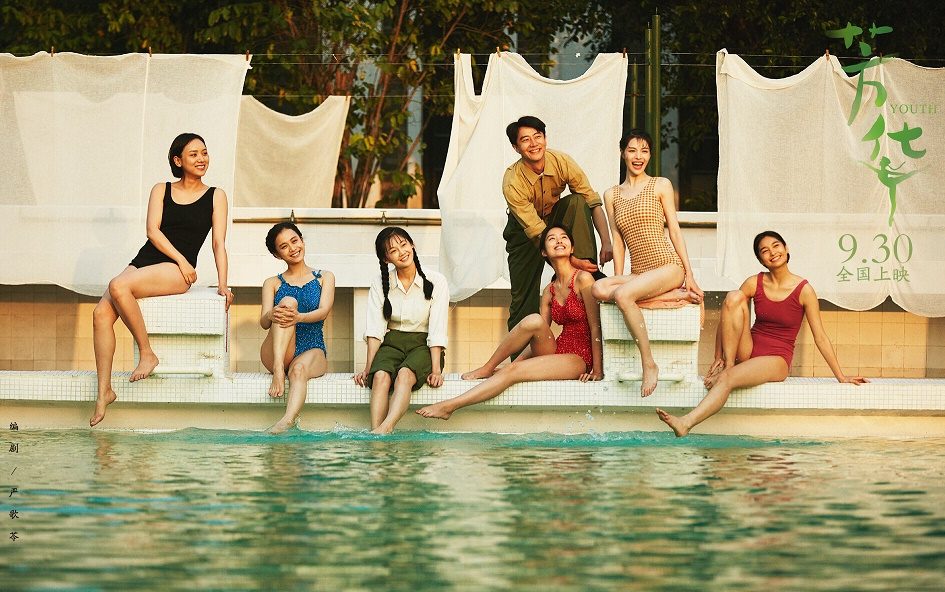Red flashes. The wooden stage shines. The star dancer executes a perfect leap. Chairman Mao’s anthems flood the military auditorium.
The audience is filled with wounded Chinese military and PTSD patients.
A bittersweet portrait of innocence stolen, “Youth” follows the lives of a performing arts troupe in the People Liberation Army during Mao Zedong’s reign. We watch the idyllic youths of our narrator Xiao Suizi and our main characters Liu Feng and He Xiaoping as they first experience the naïve camaraderie of a tight-knit arts community isolated from the nation’s hardships to the lust, betrayal, and heartbreak of young adulthood to the sobering wars and political battles they must eventually endure.
Though Youth’s cinematography may, at times, make Mao Zedong’s era seem too candy-sweet, the film actually quietly dismantles many of the romantic notions held by present-day Mao nationalists.
The graceful, strong song and dance of the arts troupe not only served to inspire the laboring masses in the film to continue working for Mao Zedong, but also demonstrated a stark contrast between the economic reality of the common people and the fantasy glory of working that the arts troupe’s performance attempts to convey. The spotless studio and flamboyant music are interrupted with information on the performers’ backgrounds as well. While He Xiaoping represents the film’s fresh-faced ingenue, audience members know that her father has been deemed an enemy of the Communist Party, which she may hide from inside the performing arts troupe. Each of the characters takes shelter from his or her personal realities of the Mao era by performing within the troupe.
The troupe’s art becomes the rose-colored past that Mao nationalists reminisce; however, director Feng strives to demonstrate that this honeyed perception is false.
Burned corpses and rotting bodies interrupt the scenes of the golden dance studio. Because when the troupe is shipped out to perform in war zones, and members must leave to fight on the front lines and tend to the wounded, we understand that Mao’s era was not merely hard work and patriotic hymns about Chinese war heroes. In a heartbreaking scene where Xiaoping has long left the troupe to serve as a battle nurse, she tends to the severe burn wounds of a dying 16-year old foot soldier who lied about his age to serve his nation; we cannot see his face since the burns have marred his face beyond recognition. Similarly, when the narrator opens a vehicle to tend to wounded soldiers, all she finds are rotting corpses—she immediately turns and retches. The film shows us that this was Mao’s reign—the burned body of a teenager, the irretrievable dead, and the loss of youth.
We should not look back on the good ol’ days, because, according to Feng, those days left only memories of the dead and the ruined lives of many. The film moves quickly through time, and when we reach the final performance before the troupe’s official disbandment after Mao’s death, the audience members are high-ranking officials—and soldiers rendered physically disabled from battle. Xiaoping, now mute, sits smack in the front row of the mental hospital patients.
In the most poignant scene of the film, Xiaoping’s fingers twitch as she watches the performance and remembers the choreography. As all eyes are fixed on the glowing stage and Communist-era music, Xiaoping slips outside and Youth switches between the performance onstage and Xiaoping, with her mental hospital’s uniform, dancing in the open grass field under the moonlight—her motions perfectly matching those of her former colleagues onstage and the swelling music. Director Feng expertly induces audience members to feel the nostalgia of the performers and Xiaoping herself—for the community once-untouched by the outside battles.
Yet, Feng demonstrates that that nostalgia is only due to their fortune in isolation because Xiaoping’s current mental state—not her beautiful dance—is the true consequence of political strife.
Although many critics call this film too sympathetic to the era due to the striking visual cleanliness of the settings, “Youth” was pushed from the originally planned September release due to political concerns from the possibility of the October Communist Party, where President Xi Jinping may consolidate power. Too sensitive for a Chinese Independence Day release, “Youth” is not a film that easily aligns with the perspective of the Chinese government.
“Youth”, with its moving visual art and tragic character downfalls does not praise the Mao era and does not look upon it with fondness. It is a critical piece that points fingers at the devastation wreaked upon the Mao generation through physical disability, PTSD, and even the lack of modern society’s care toward its veterans.
“Youth” is about not idealizing the Mao era; it is about the youth lost within it.

